MR. SPOILER RISING!
I’ve spent six episodes in a row applauding season two of STAR TREK: PICARD. To me, with the exception of a few minor stumbles, it seemed the latest season of this series could do no wrong. But the seventh episode, “Monsters,” didn’t only stumble, it fell flat on its face…at least in my opinion. There was some good scattered among the bad—including the usual stellar performances (especially guest star JAMES CALLIS, of Battlestar Galactica fame, as Picard’s therapist/father).
But for the most part, “Monsters” was a bit of a train wreck in many different ways. Let me count them…
IT STARTED IN THE WRONG PLACE…
A cliffhanger ending makes a “deal” with the viewer: you come back next episode, and we’ll show you how your heroes will get out of this mess. It doesn’t always have to be the very first scene of the next episode, but it’s usually pretty close. Think about the cliffhangers we’ve seen already this season—all but one, episode four, started moments after the end of the previous cliffhanger. (Episode three ended with Rios getting arrested by I.C.E. agents. Episode four began with Picard and Jurati, but twenty second later, we see Seven and Raffi entering the clinic where Rios was taken into custody.)
Episode six ends with Queen/Agnes walking the night streets of Los Angeles, up to…well…something. But what? But then episode seven begins with Picard in his tuxedo talking to some Starfleet counselor. Of course, since episode six also left us with Picard in a coma and Tallinn about to do a techno-mind-meld, that scene is kind of okay to start off with. But it’s a 5-minute scene, which is kinda long to wait for a follow-up to the main Queen/Agnes cliffhanger.
But then we have a second non-Agnes scene—this one 3 minutes—of young Jean-Luc Picard as a little prince and his maman as a queen painting windows. Okay, so we’ll have to wait until after the opening credits to see where Queen/Agnes went. But no again! In fact, it isn’t until 35 minutes into the episode that we see what Queen/Agnes did after the cliffhanger. And that was WAY too long.
This was, in my opinion, a poor editing choice by director JOE MENENDEZ, who has a long 30-year directing career, but this is his first time directing any kind of Star Trek episode. And indeed, the Queen/Agnes storyline kinda went nowhere in this episode. But the scene where a partially-assimilated cyberneticist walks into a bar could and should have either appeared first (before Picard and the shrink) or, at latest, after the opening credits.
UNINSPIRED AND UNORIGINAL
Dealing with Picard’s hidden trauma and repressed memories by going into his mind (and having Tailinn join him) was not, in and of itself, a bad idea. You can do a lot inside someone’s head…at least on TV or in cinema. This would give fans a chance to discover previously-unknown things about Jean-Luc Picard (a tall order after 180 episodes of TNG, four feature films, and a season and a half of a second television series!). And it would give Taillinn a chance to get to know Picard better and maybe even begin to develop feelings for him (as I suspect Taillinn is Laris and not simply a distant ancestor).
There was so much they COULD have done examining this hitherto unexplored aspect of Picard’s childhood. But instead, the show went where Star Trek and other shows have already gone before—often!—much to the detriment of the episode’s potential.
The “talking to a counselor/doctor/therapist set-up has been done many, many times before…including in Star Trek: The Next Generation itself. The episode “Frame of Mind” has Riker switching back-and forth between the Enterprise and an insane asylum where, among other experiences, he is having therapy sessions with a doctor there.
Granted, it was amazing seeing the two accomplished British thespians (Stewart and Callis) go mano-a-mano in their therapy session, but strangely and unexpectedly, I got little out of watching them banter. Picard’s evasiveness and obfuscation and the therapist’s obvious belligerence didn’t really give me more insight into previously-unexplored aspects of the admiral’s psyche.
I was also constantly distracted by Callis’ “hybrid” early/late DS9 uniform. It had the color scheme and wrist striping of the later uniform style but without the vertical stitching pattern on the shoulders. For a show that’s been hewing fairly closely to canon, this felt like an unforced error. On the other hand, it was all an illusion in Picard’s mind, so I need to let it go.
Then there were the “monster in the house” scenes with young Jean-Luc and Taillin. I’m not sure if the writers for Picard are required to watch the other Paramount+ Star Trek shows (just to make sure they don’t inadvertently steal an idea), but a child-based “monster in the house” approach was the basis of the eleventh episode of DISCOVERY‘s third season, “Su’kal.” In that episode, it wasn’t a mindscape so much as a failing holodeck world surrounding the Kelpien boy who literally cried the Burn of all of the dilithium in the galaxy. But the dark, haunted house feel with a scary monster was essentially the same. So again, nothing really new to see here.
A BAD CASTING CHOICE?
Did you know that actor HALEY JOEL OSMENT, the child actor who starred in The Sixth Sense (“I see dead people…”) and A.I. and played Forrest Gump’s son, auditioned for the role of young Annakin Skyswalker in Star Wars: The Phantom Menace? I often wonder if that film would have been less disappointing if a more skilled child actor like Haley had been cast in the role instead of JAKE MATTHEW LLOYD.
I felt the same way about the decision to give DYLAN VON HALLE his first-ever television acting role as young Jean-Luc Picard this season. Dylan doesn’t seem to have the range to give a compelling performance. Of course, you can’t expect as much out of child actors as their adult counterparts. But like Haley Joel Osment and CAILEY FLEMING (the amazing actress who began playing the character of Judith Grimes on The Walking Dead when she was eleven), there are some kids out there who can knock it out of the park in front of the camera.
Dylan isn’t one of them.
His performance, sadly, is one-note: insecure, deer-in-headlights, drowning within a sea of melancholy. His eyes appear listless and deadened. The only emotion he seems to show other than fear is trepidation…which is also fear. Had he showed even a little joy in those first scenes with his mother, even a glimmer, I would have felt at least some of the loss of childhood purity and innocence when his mother began having her mental episode. But instead, I felt no connection—essentially no anything—for this little boy.
Now maybe this was a directorial decision, but if so, it was not a good decision, at least for me as a viewer. I wanted to feel more for for young Jean-Luc—sympathy, concern, sadness—but the performance just didn’t bring any of that out.
APPARENTLY, IT’S NOT “JUST” DEPRESSION…
Going into this episode, I assumed (incorrectly so) that Picard’s mother suffered from depression…like nearly 20 million Americans. I was actually looking forward to seeing Picard shine a light on this “silent killer” and giving previously invisible people (depression sufferers and their families) a chance to be seen…much like Discovery has done for non-binary and transgender individuals.
To my surprise (and possibly the surprise of others), Picard’s mother actually suffers from schizoaffective disorder, bipolar type…a form of delusional paranoia combined with depressive and/or manic psychotic episodes. Much rarer than simple depression, this mental illness that affects less than a million Americans.
As my good friend Dr. Christo Franklin, a psychological clinician, explained to me, children of parents with this disorder (if not treated) often develop trust issues, desperate to find a source of stability and certainty to counter the psychotic hallucinations that the parent sometimes/often has. If left alone with a parent who is having an episode, the child will often buy into the delusion because the alternative—accepting that their “trusted” parent cannot be trusted—is too difficult to process. Such children can often be emotionally traumatized and scarred for life. This is what happened to young Jean-Luc when he went with his mother into the tunnels beneath the chateau, trusting her and believing her delusions to be real.
In other words, this is pretty heavy stuff…way more than “simple” depression! This wasn’t necessarily a bad thing, mind you, and I understand that the writers were trying to create a tragic Shakespearean female character (most of the Bard’s woman characters ended up going insane for some reason). But this makes Jean-Luc Picard’s issues much more complex and more difficult to resolve than, I suspect, this series will depict. Already, the adult Jean-Luc Picard has overcome many basic trust issues he might otherwise have had; he has trusted so many Starfleet comrades along the way. The writers might see trusting fellow officers as different than “learning to love and let someone else inside,” but in fact, the simple act of trusting anyone was already the big step for him.
IT’S ALL RELATIVE
While I didn’t really have a problem with the revelation of Yvette Picard’s mental disorder to be something much more traumatic to a child than simple depress, there were still a couple of other things that bothered me about the Picard story.
Even though he in a mental haze, Picard doesn’t recognize his own father??? That was a big, “Oh, by the way…” moment as the writers suddenly reveal, after watching more than half the episode, that—surprise!—this is really Maurice Picard and not some Starfleet psychologist. Indeed, Picard’s father was always against his son joining Starfleet, so it’s unlikely that Maurice was ever, himself, in the service…so that really threw me off the scent But I felt rather manipulated by the writers all so that I would see the scene, be shocked, and go, “Oh, it’s really his FATHER!” Instead, I wondered, “Why didn’t Picard recognize his father?” Not a good moment.
I also felt frustrated by the total absence of any reference to Jean-Luc’s older brother, the late Robert Picard. After all, the two boys were raised by the same mother, and her disorder and death would likely have affected her older child, as well. Perhaps he was away at boarding school or something when she began having episodes (which can start as late as the age of 30), but no mention at all of Picard’s brother Robert left me feeling a bit irked, as this season has actually been pretty good at honoring canon.
PICARD/TAILLINN/LARIS/WHATEVER
Another “Oh, by the way…” moment happened when Taillinn reveals the true appearance of her left ear. “Oh, by the way, Taillinn is Romulan.” Call the Dream Police because this is another cheap trick by the writers! After “fooling” us by making us think—for the last three episodes—that Taillinn is a human who looks exactly like Laris (although there were clues in episode five when her PADD and display featured Romulan letters and design), we now discover that, whoa, she’s a Romulan after all! How about that shock!
And oh, the folks that sent her to earth usually send the same species, but occasionally they send agents who are “similar”? C’mon, writers! Don’t be ridiculous! Why would they take that kind of a risk on such a long-term Earth assignment? If her tech fails for some reason at any time, the “watcher” becomes the watched—the literal opposite of invisible!
Anyway, now there are two options: Taillinn is either an ancestor of Laris or else is Laris herself…only MUCH younger. Man, I hope it’s the latter because it’s getting kinda unbelievable how many ancestors of Noonian Soong look EXACTLY like each other! One character with identical family resemblances I can accept, but two is pushing it, people!
But in the end, I’m disappointed because I really just don’t care about this coupling…even though I really wanted to. I thought by this point in the seasonal story arc that I’d be rooting for Picard to get over his relationship issues and for him and Taillinn/Laris to live happily ever after. And I’d hoped this episode with all of the mental revelations would do the trick. It didn’t. I’m way more invested in seeing Seven and Raffi get together—and Rios and Dr. Teresa, for that matter—than I am in Picard and Tallinn/Laris.
THE “BIG REVEAL” MOMENT
Speaking of Rios and Dr. Teresa, this episode featured the “big reveal” moment when Rios reveals who and what he really is: a time-traveler from the future. It’s funny how often Star Trek characters break the temporal prime directive and spill the beans. In fact, “The City on the Edge of Forever” is one of the only times our heroes visit Earth’s past and DON’T tell somebody they’re from the future!
So I kinda expected this to happen, and I will admit that I enjoyed seeing the reveal play out—like watching an episode of 21 Jump Street and getting to the moment when JOHNNY DEPP explains that he’s not really in high school but is actually an undercover police officer…or getting to the moment when Detective Colombo demonstrates that he’s not a clueless idiot and has, in fact, had the mystery solved the entire time.
And let’s face it, this line was a fan’s paradise…
However, there were two aspects of the big reveal that bothered me. The first is HOW it happened…essentially an I Love Lucy sitcom moment where Dr. Teresa is locked out of her treatment room, unable to get to her patient. Rios tries to lie but can’t. Ha, ha…right? Well, that’s one way to do it, of course, but it really does make Rios look kinda weak-willed and incompetent, since he knows he need to protect the timeline from “butterflies.” I understand that Rios wasn’t really given another choice, but that was the writer’s fault for setting up the reveal in this way.
What might have been more exciting and heroic (for Rios) is to put Teresa and her son Ricardo into some kind of jeopardy and have Rios decide there is no choice but to use futuristic technology (like a transporter) to save the day, even though that means revealing their secret. At least then Rios would look more like a decisive leader and less like Lucy and Ethel caught trying to hide something from Ricky and Fred.
The only other thing that bothered my was when Rios gives the futuristic neuro-oscillator to Dr. Teresa and she immediately knows how to use it: where to hold it (a few inches from the patient’s head rather than pressing it against the forehead, how to turn it on (it doesn’t need to be set first?), and how long to leave it on. If I handed my iPhone to to George Washington, I doubt he’d be able to figure out how to work it in the first 5 seconds.
SOME FINAL THOUGHTS…
Before hibernating for another week, let me share a few random observations and theories.
First, I’m intrigued by the “birth of a new Borg Queen” plotline. The idea that endorphins in the brain can accelerate the assimilation process is just technobabbly enough to expand the Star Trek mythos, and it also provides a compelling non-Q villain and a “ticking clock” as we gear up for the 3-episode sprint to the end of the season.
Also on the “to do” list for the final three episodes is Kore Soong and her dad, who along with Q, were completely MIA in this episode. That said, considering the time frame (this entire episode takes place in the 12 hours after Picard got run over), Kore is probably still doing her research on her dad while Adam is sleeping off his vehicular murder attempt. So this episode might have been a little too soong (ouch!) to check in on them.
While I enjoyed seeing Guinan again and liked her striking the anti-Q “pose” from the TNG episode “Q Who,” I just had to wonder why she—of all the El-Aurians in all the gin joints on all the planets in all the sectors of the galaxy—was the one entrusted as keeper of the Q-phone bottle thingie. Isn’t that a little dangerous a thing to leave in a Los Angeles bar on a primitive planet teetering on the edge of nuclear armageddon? At least put it in a hotel safe on Risa or something! But this does make one wonder just how important an El-Aurian that Guinan might be????
Of course, now that we’ve summoned the genie and he didn’t appear, it seems pretty obvious that something is wrong with good ol’ Q. Maybe Picard ain’t the only one gettin’ long in the tooth…or Qth! (Somebody stop me!)
And last but not least: a prediction. Having a cliffhanger with the FBI arresting Picard and Guinan at the end was certainly exciting! But the lead FBI detective at the end of the episode was played by JAY KARNES, an actor who, twenty-two(!!!) years ago, played 29th century Lieutenant Ducane of the Federation timeship Relativity in the fifth season Voyager episode “Relativity.”
Now, casting Karnes in the role of FBI agent might have simply been a coincidink. After all, co-showrunner TERRY MATALAS worked with Karnes on the television series 12 Monkeys (along with actor James Callis, as it happens), and Karnes played an FBI agent on that previous series, as well. So it could just be a case of a producer simply hiring an actor he was already familiar with for a similar role.
BUT!!!
Wouldn’t it be interesting if Karnes were reprising his role of Ducane, trying to protect the timeline from contamination from other time-travelers? Obviously, Ducane would need to have already infiltrated himself into the FBI command structure, but I suspect this might be a long-term undercover Earth assignment…like Taillinn.
Anyway, bringing a 29th century time-traveler into the story creates another opportunity for Star Trek “canonization” during the season, but it also presents other options for returning to the future without using the Borg Queen to run the slingshot calculations. In other words, Agnes might be expendable! Hmmmm…maybe she becomes the new Borg Queen after all.
Oh, and raise your hand if you think Renée Picard isn’t really safe now…
Three episodes to go—seeya next week!

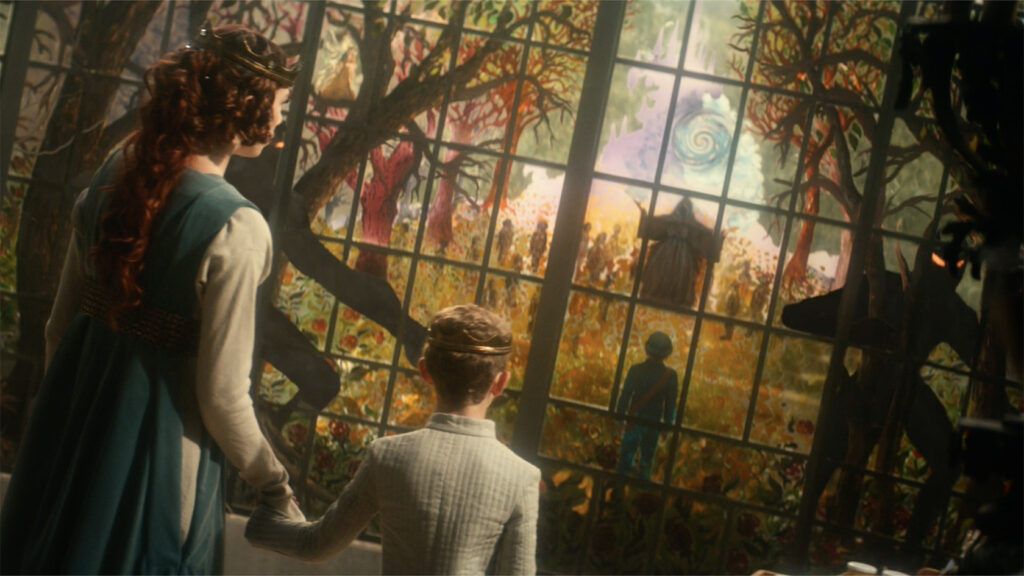
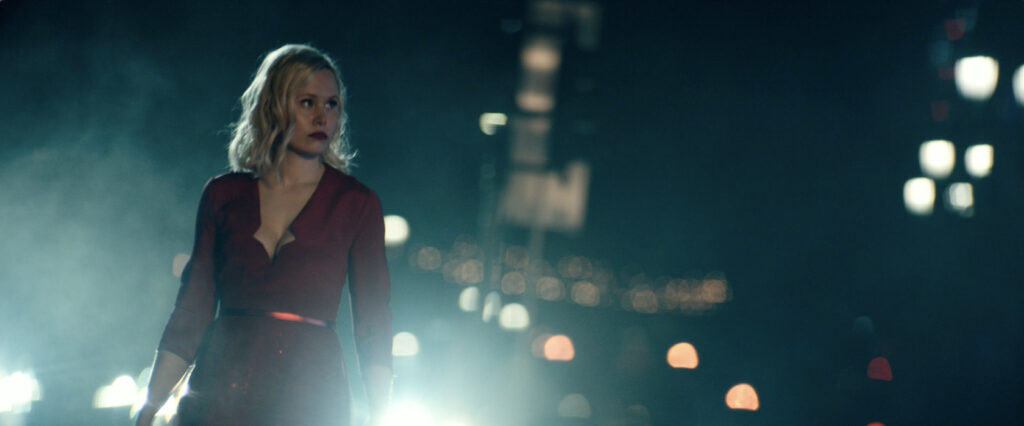
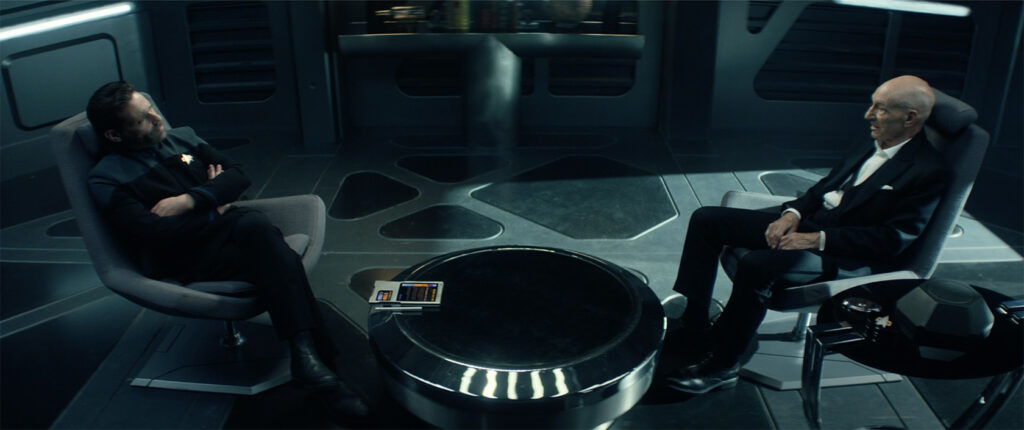
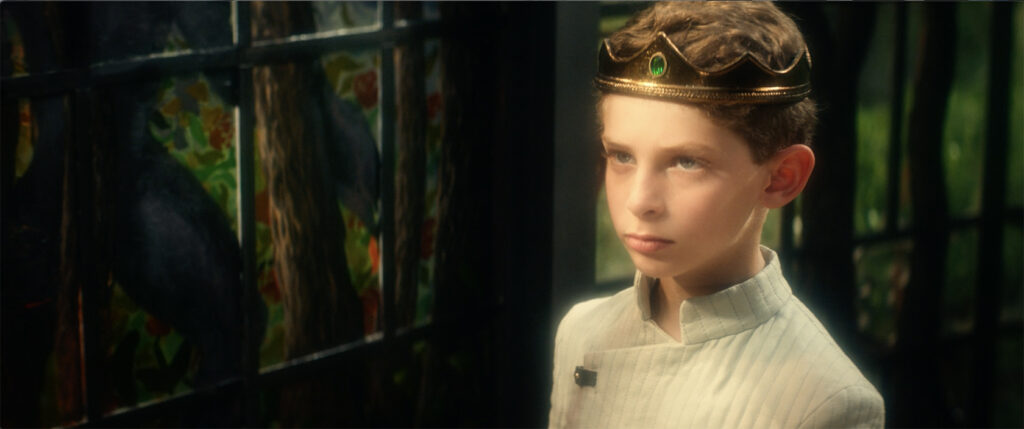
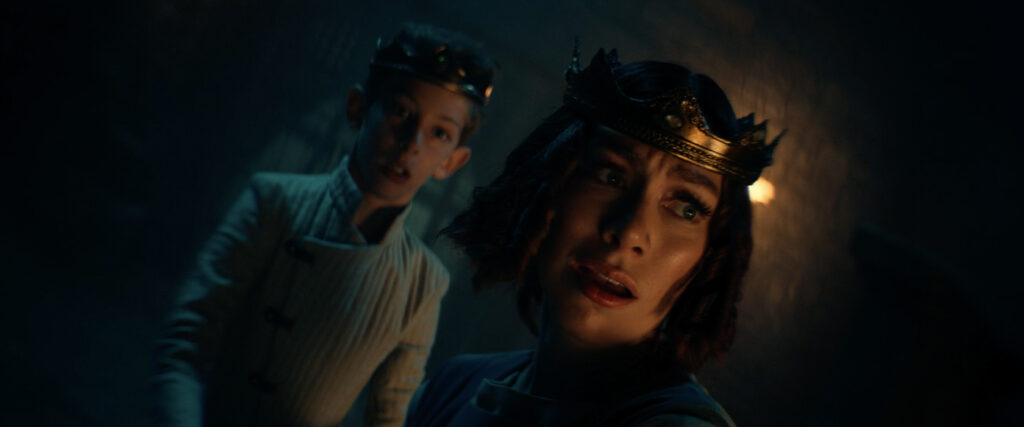
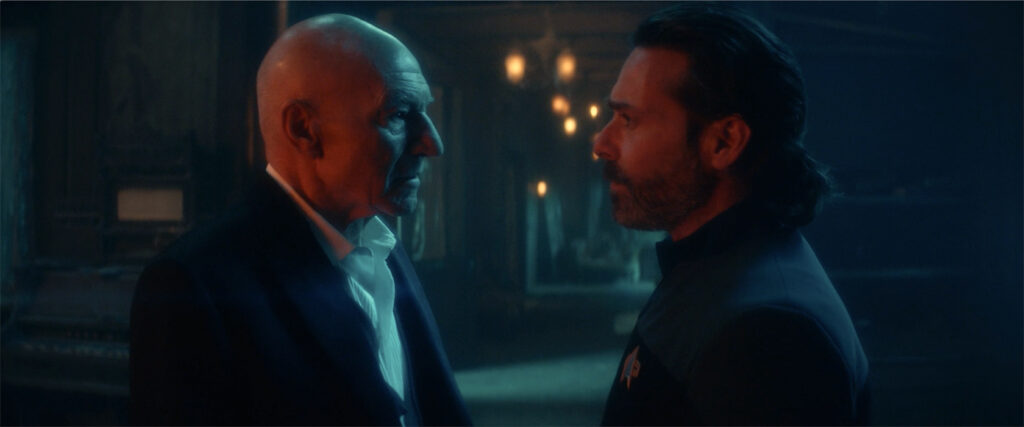
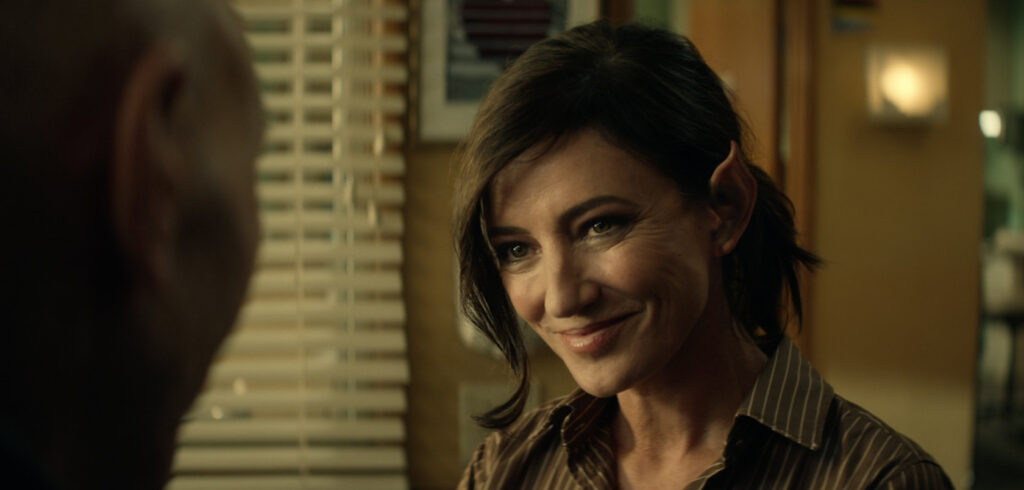
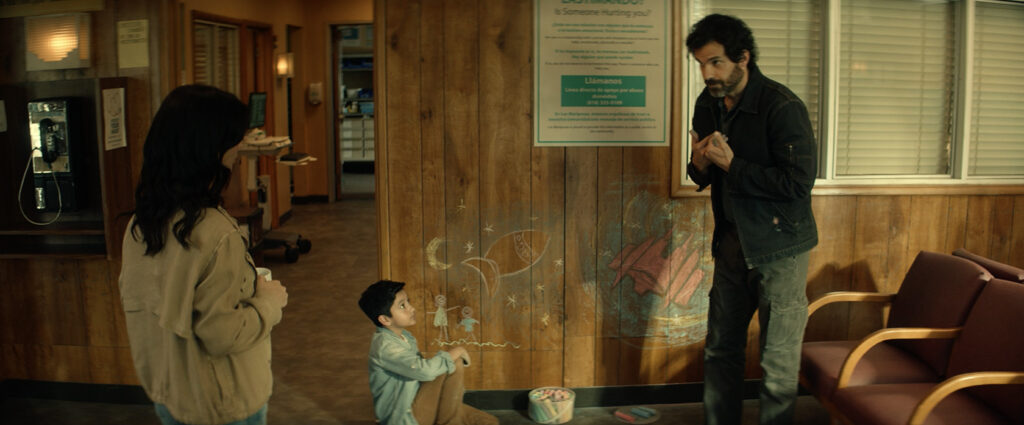
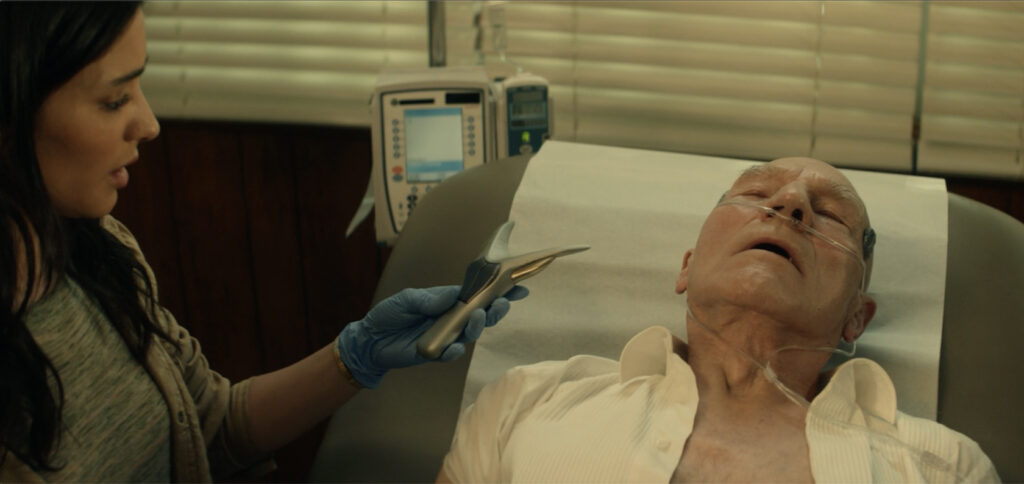
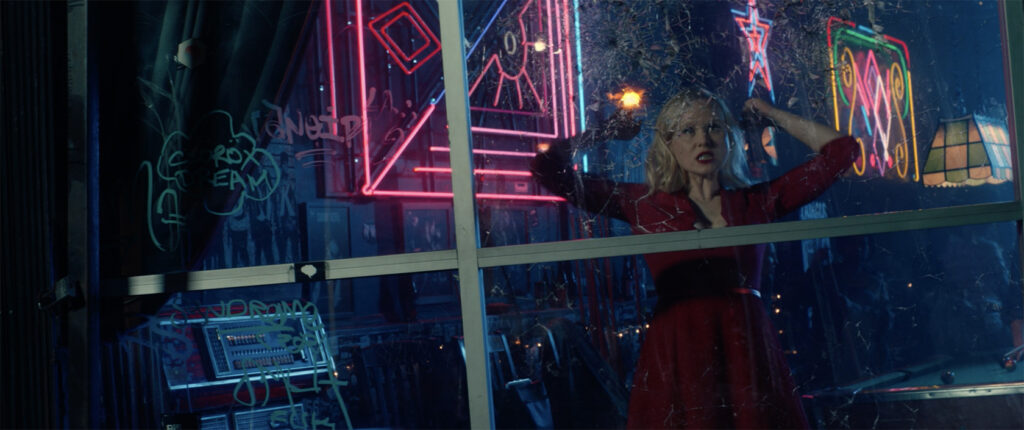
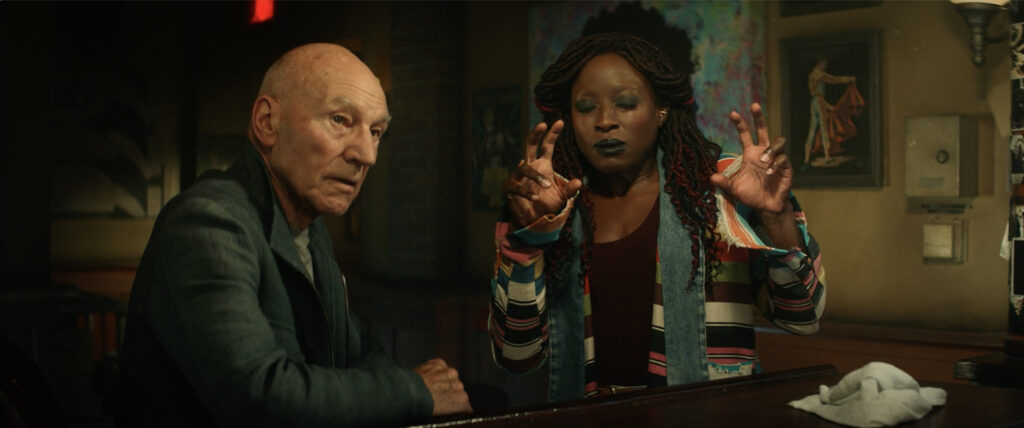
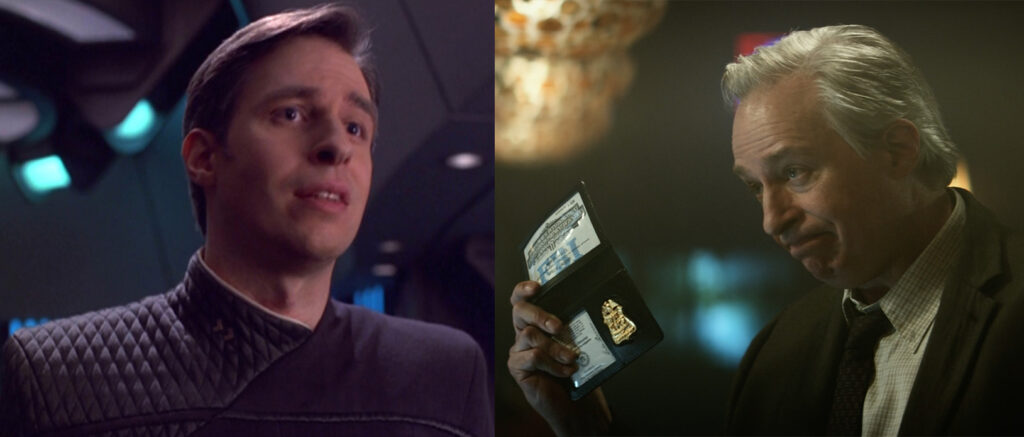
I’m going Spock and McCoy on you now:
Logically your analysis is accurate. The episode did have the weaknesses you noted in your review. Logically the magical super-sauce would not be in an Earth bar in 2024. And it’s not logical to me that the entire idea of Guinan’s race being so powerful but not powerful enough when it came to Soran, an El-Aurian, seeming to lack that almost extreme Borg-equivalent power in the movie Generations? That’s not logical.
Emotionally what had me from the last episode is the Picard/fear plot. So to me there was emotional continuation from the cliff-hanger. Maybe there were too many plot elements hanging from the cliff but I was happy to see what I wanted to see. And that’s partly from knowing that the whole issue of Picard’s emotional state will take the rest of this season and season 3 to work out. So it’s a multi-year plot.
And Picard’s father would not logically be wearing a variant of a Star Fleet uniform, but this was a semi-dream sequence and logic does not simply apply. To insist on logic where logic does not apply is illogical.
I’m totally down with the whole “It’s all a dream” explanation of Picard not recognizing his father, Jerry. My point is simply that it’s a distraction for the viewer when it happens. The “Oh, my gosh!” moment for me was overwhelmed by the, “Hey, wait-a-sec…” reaction. I just don’t like too many, “Oh, by the way…” tricks by the writers in one episode. Actually, I don’t usually like ANY. They’re too convenient and manipulative.
I don’t have a problem with the cliffhanger, we (or at least I) always felt going into this episode that it was about Picard and entering into his dreams. Agnes/BQ cliff-hanger at the end didn’t really feel like a cliff-hanger, we already knew that the BQ was in control, that end scene was just “oh, and this also happens, mwahahaha”.
“it’s getting kinda unbelievable how many ancestors of Noonian Soong look EXACTLY like each other” I don’t believe that they do, I see the same actor playing them all as metaphor rather than say they actually look exactly like one another. Kate Mulgrew played Janeway’s ancestor, Shannon O’Donnel, in 11:59; Jolene Blalock played T’Pol’s ancestor in Carbon Creek; Michael Dorn played Worf Son of Mogh’s ancestor in The Undiscovered Country, Denise Crosby portrayed Natasha Yar’s decendent Sela.
And I also feel totally down with the “it was a dream” explanation of why Picard didn’t recognise his own father, I sometimes don’t recognise people in my own dreams, because dreams also work as metaphor.
With Picard’s brother, Robert, it was explained previously that Picard was closer with his mother and Robert was not. Yvette and JP both exist as feelers and they seemed to share a bond with that.
What I didn’t like about this episode was the way they treated Yvette with this being the 24th century and all, it felt so horribly barbaric. With this series being set in the 21st century we can easily forget the Utopia of the 24th TNG era, so this just felt horrible to me. Also how was this not known about Picard? Didn’t Deanna have this in Picard’s profile? What happened with the Starfleet psych tests that we saw Wesley undertake? (I also didn’t like Rios, a Starfleet Captain, breaking the temporal prime directive like that, I expected better of him, and Dr. Teresa using the 24th century medical instrument, I would have thought Rios, a 25th century Starfleet Captain with presumably basic first-aid training would have had a better handle on using 25th century tech than a 21st century doctor; then again, alternate timeline tech, so different from prime timeline tech?).
My Q theory (that I mentioned last time) was that he has unwittingly un-Q’ed himself. Remember Q got thrown out of the continuum and was made human in Deja Q, we now exist in an alternate timeline and thus Deja Q didn’t happen, so Q doesn’t have his powers. Remember in the 2nd episode in the alternate future Q appeared in his TNG visage and then snapped his fingers to give himself an older visage? Then in 2024 we see him in this older visage, therefore logically he appeared to Picard in the alternate timeline before he created it, and we know Q can create paradoxes like this as we saw in All Good Things… maybe Picard bringing a Borg Queen back in time has also thrown a spanner in Q’s proverbial works. We shall learn more next week. 🙂
Your Q theory makes my brain hurt, Jack. 🙂
Your Q theory makes my poor brain hurt, Jack. 🙂
But it makes sense right? Why else would Q look old in Picard’s past compared to his youthful self in Picard’s alternate 25th century present. Unless it was a mistake which could have been an intentional mistake to help people’s brains, but that would still make it a mistake.
And apologies for my bad terminology, I should have said “My Q hypothesis”.
With your Ducane hypothesis I like it, but this raises the all important question if true: which timeline does Ducane come from? Prime, Q’s alternate timeline, or perhaps this new Borg timeline?
Also I have a question for you. Did they say that Yvette had “schizoaffective disorder, bipolar type”, or did you recognise it from your psychology background? I find some lines I don’t hear for some reason, I will try to replay them, but I can’t make it out what they say; I didn’t hear the reference to Sisko either, but I have seen it talked about. I think I will wait until the end of the season before I look up the “disorder”, I want to see how the series resolves the situation first.
Back when I majored in psychology at Cornell in the late 1980s, schizoaffective disorder, bipolar type was known by a different name and somewhat different diagnosis. I was a bit fuzzy on the details, so I called up my close friend Christo, who is a clinical psychologist here in Los Angeles, to double-check my nomenclature and symptom list. I described the episode plot, and he diagnosed Picard’s mother right there on the spot without even interviewing her! Actually, the diagnosis was a little bit of a guess, as even though Yvette was obviously having a manic episode when she took Jean-Luc down into the tunnels, a true manic episode would include much faster speech and possibly even some babbling, and Yvette was talking at a fairly normal speed and quite coherently.
I dislikes Season 1 for many reasons. I was encouraged by a pretty great first episode of Season 2; but no, this season as well is entirely too disappointing. This particular episode did go in a direction I wasn’t expecting. I had thought that Stewart’s wonderful openness and willingness to raise awareness around matters of domestic violence we’re at the root of his mother’s character’s tribulations. The mental illness direction was unexpected. Beyond that, pretty much every other writing / editorial / directorial decision puts this series firmly in the dumpster. I understand the “fan service” of using (every! See Season 3) TNG actor in some capacity. Ok, fine, it’s a Q-created reality after all. Every sci-fi story requires suspension of reality, but … I had such high hopes for Picard.
Here’s my biggest beef, and it’s at the heart of Season 2: when did Picard become such an emotionally dysfunctional character, so unwilling/unable to commit to a romantic relationship? His relationship with Crusher was restricted to a degree by command structure and the responsibilities of the centre seat. But there were many others, notably that science officer for whom he shared a romance and musical expression; the love interest in “Insurrection” and let’s not forget the *lifetime* (albeit only mental) of his married life with children and grandchildren from “Inner Light”! Jean-Luc Picard’s character is being treated far too superficially with such a trite “exploration” of an aspect of his character that has little evidence of being as damaged as it is portrayed to be.
It’s just a TV show. Sigh. Yeah….
I suspect the writers are hanging their hats on each of those relationships–besides the one in “The Inner Light,” which was implanted artificially–did not last. Picard can get romantically involved, but he can’t take it to a more permanent level. He can’t let himself truly fall in love.
A bit of a stretch? Perhaps. But that’s where they decided to go, and I’m but a passenger on this trip. So I’ve decided to enjoy the ride, admire most of the scenery, and see where we wind up.
Ooh, good point RE Inner Light. He had all of his Picard memories with him there, yet he committed, had a long relationship, had children.
And as I said above, all of this with his mother would have been in the Federation files so Deanna would have known, and the people who did the psych test at the Starfleet entrance exam.
I still love this season though, and S1. 🙂
“My point is simply that it’s a distraction for the viewer when it happens. ”
“Some viewers”. https://screenrant.com/star-trek-picard-maurice-ds9-uniform-generations-explained/ explains the uniform. That might not be correct analysis but that explanation makes sense to me.
Okay, “some” viewers. 🙂